Abhishek Sethi
Alexa Conversations: An Extensible Data-driven Approach for Building Task-oriented Dialogue Systems
Apr 19, 2021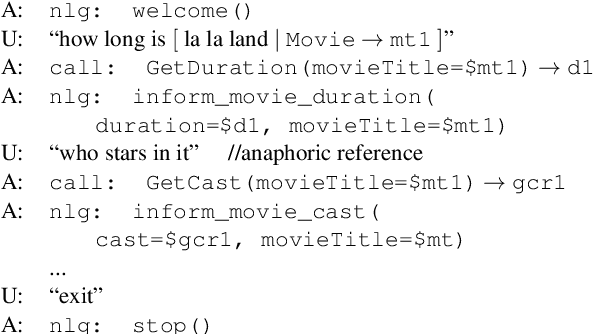
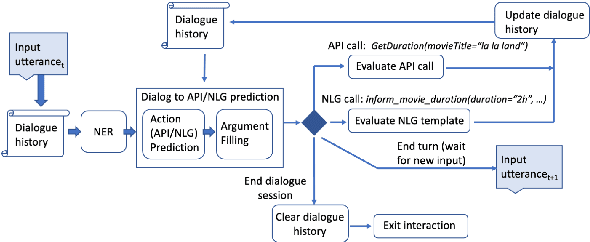

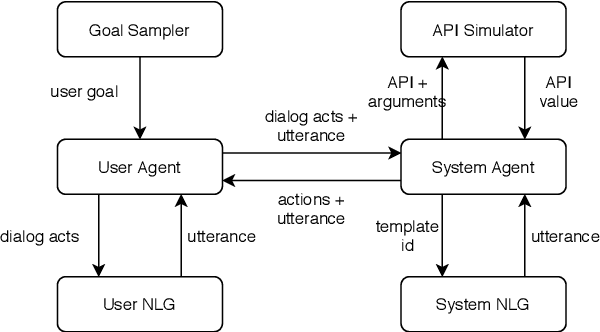
Abstract:Traditional goal-oriented dialogue systems rely on various components such as natural language understanding, dialogue state tracking, policy learning and response generation. Training each component requires annotations which are hard to obtain for every new domain, limiting scalability of such systems. Similarly, rule-based dialogue systems require extensive writing and maintenance of rules and do not scale either. End-to-End dialogue systems, on the other hand, do not require module-specific annotations but need a large amount of data for training. To overcome these problems, in this demo, we present Alexa Conversations, a new approach for building goal-oriented dialogue systems that is scalable, extensible as well as data efficient. The components of this system are trained in a data-driven manner, but instead of collecting annotated conversations for training, we generate them using a novel dialogue simulator based on a few seed dialogues and specifications of APIs and entities provided by the developer. Our approach provides out-of-the-box support for natural conversational phenomena like entity sharing across turns or users changing their mind during conversation without requiring developers to provide any such dialogue flows. We exemplify our approach using a simple pizza ordering task and showcase its value in reducing the developer burden for creating a robust experience. Finally, we evaluate our system using a typical movie ticket booking task and show that the dialogue simulator is an essential component of the system that leads to over $50\%$ improvement in turn-level action signature prediction accuracy.
Controlled Text Generation for Data Augmentation in Intelligent Artificial Agents
Oct 04, 2019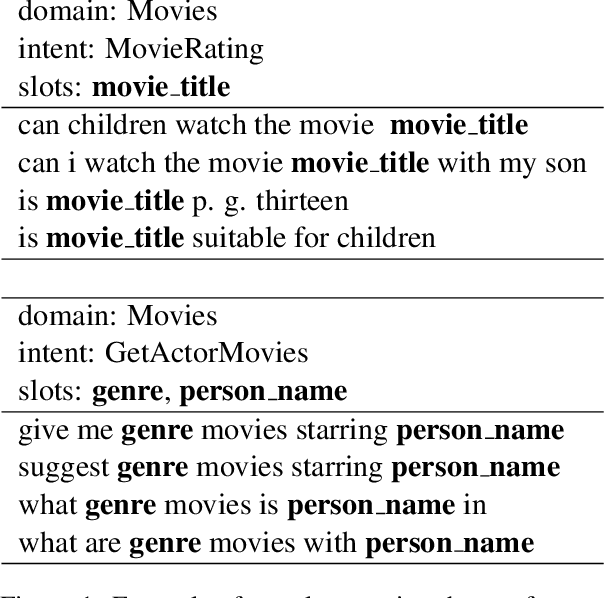
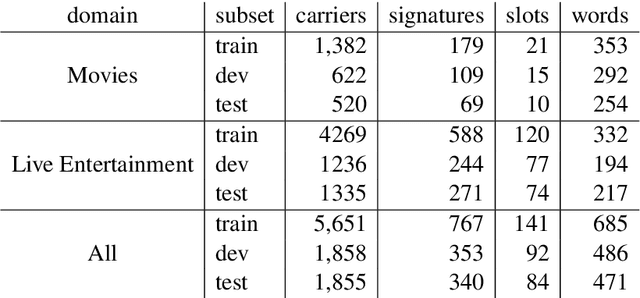
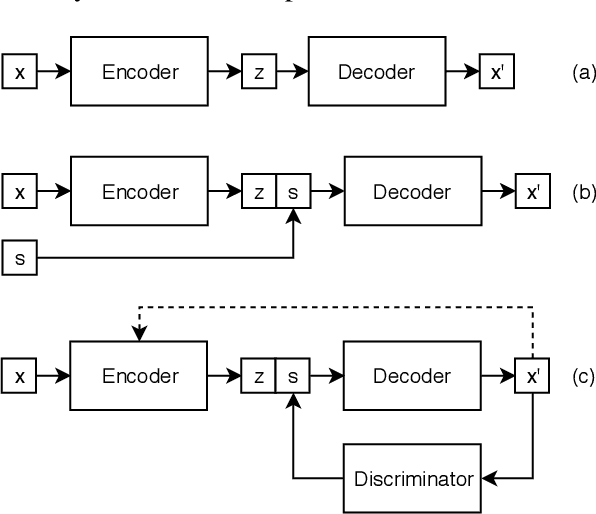
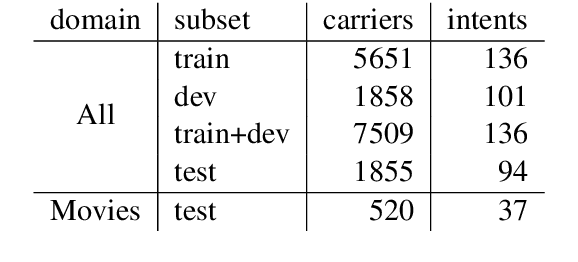
Abstract:Data availability is a bottleneck during early stages of development of new capabilities for intelligent artificial agents. We investigate the use of text generation techniques to augment the training data of a popular commercial artificial agent across categories of functionality, with the goal of faster development of new functionality. We explore a variety of encoder-decoder generative models for synthetic training data generation and propose using conditional variational auto-encoders. Our approach requires only direct optimization, works well with limited data and significantly outperforms the previous controlled text generation techniques. Further, the generated data are used as additional training samples in an extrinsic intent classification task, leading to improved performance by up to 5\% absolute f-score in low-resource cases, validating the usefulness of our approach.
Dialog State Tracking: A Neural Reading Comprehension Approach
Aug 15, 2019



Abstract:Dialog state tracking is used to estimate the current belief state of a dialog given all the preceding conversation. Machine reading comprehension, on the other hand, focuses on building systems that read passages of text and answer questions that require some understanding of passages. We formulate dialog state tracking as a reading comprehension task to answer the question $what\ is\ the\ state\ of\ the\ current\ dialog?$ after reading conversational context. In contrast to traditional state tracking methods where the dialog state is often predicted as a distribution over a closed set of all the possible slot values within an ontology, our method uses a simple attention-based neural network to point to the slot values within the conversation. Experiments on MultiWOZ-2.0 cross-domain dialog dataset show that our simple system can obtain similar accuracies compared to the previous more complex methods. By exploiting recent advances in contextual word embeddings, adding a model that explicitly tracks whether a slot value should be carried over to the next turn, and combining our method with a traditional joint state tracking method that relies on closed set vocabulary, we can obtain a joint-goal accuracy of $47.33\%$ on the standard test split, exceeding current state-of-the-art by $11.75\%$**.
MultiWOZ 2.1: Multi-Domain Dialogue State Corrections and State Tracking Baselines
Jul 02, 2019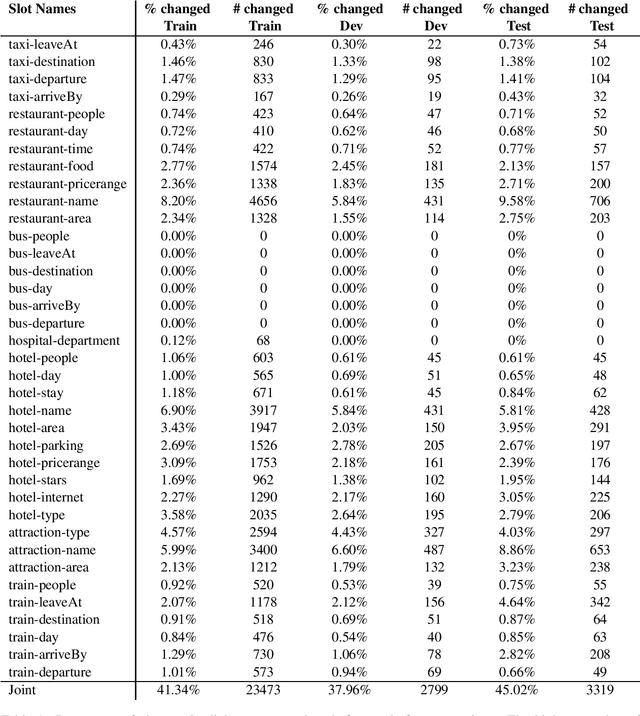
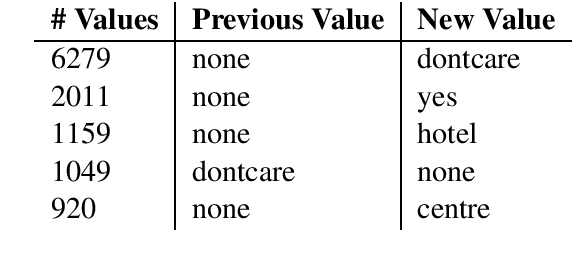

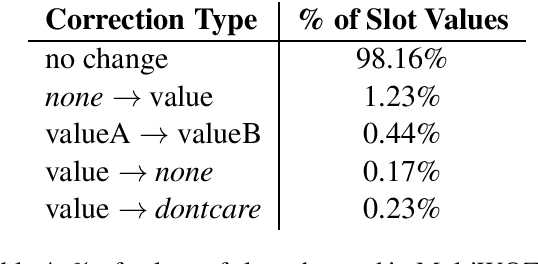
Abstract:MultiWOZ is a recently-released multidomain dialogue dataset spanning 7 distinct domains and containing over 10000 dialogues, one of the largest resources of its kind to-date. Though an immensely useful resource, while building different classes of dialogue state tracking models using MultiWOZ, we detected substantial errors in the state annotations and dialogue utterances which negatively impacted the performance of our models. In order to alleviate this problem, we use crowdsourced workers to fix the state annotations and utterances in the original version of the data. Our correction process results in changes to over 32% of state annotations across 40% of the dialogue turns. In addition, we fix 146 dialogue utterances throughout the dataset focusing in particular on addressing slot value errors represented within the conversations. We then benchmark a number of state-of-the-art dialogue state tracking models on this new MultiWOZ 2.1 dataset and show joint state tracking performance on the corrected state annotations. We are publicly releasing MultiWOZ 2.1 to the community, hoping that this dataset resource will allow for more effective dialogue state tracking models to be built in the future.
Parsing Coordination for Spoken Language Understanding
Oct 26, 2018
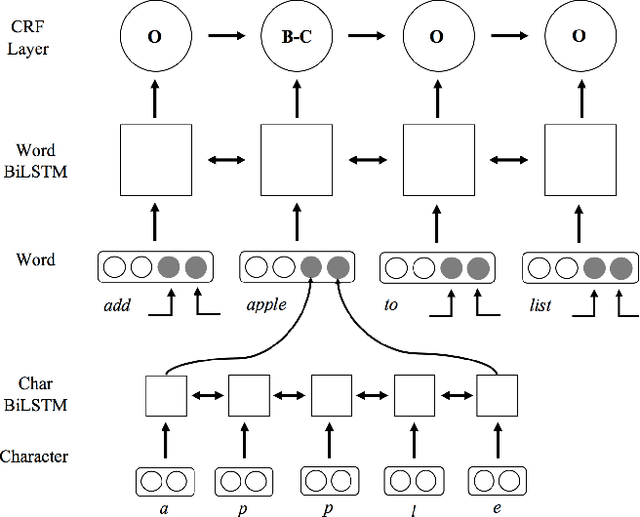

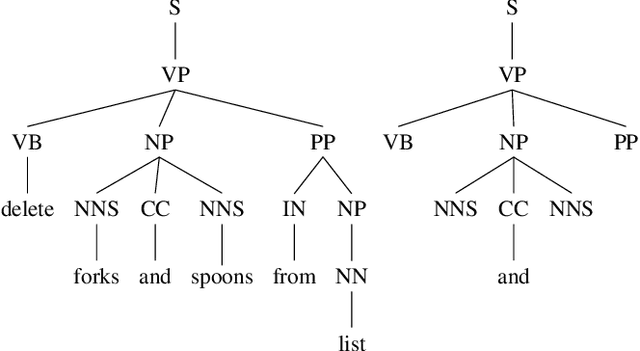
Abstract:Typical spoken language understanding systems provide narrow semantic parses using a domain-specific ontology. The parses contain intents and slots that are directly consumed by downstream domain applications. In this work we discuss expanding such systems to handle compound entities and intents by introducing a domain-agnostic shallow parser that handles linguistic coordination. We show that our model for parsing coordination learns domain-independent and slot-independent features and is able to segment conjunct boundaries of many different phrasal categories. We also show that using adversarial training can be effective for improving generalization across different slot types for coordination parsing.
 Add to Chrome
Add to Chrome Add to Firefox
Add to Firefox Add to Edge
Add to Edge